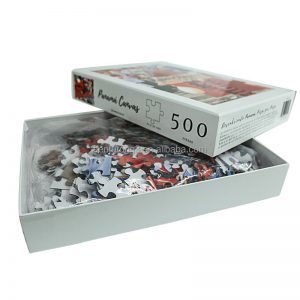If you want to buy a list of toys for a doll, you can’t miss a children’s educational toy puzzle game! A child is born a blank sheet of paper, and his preferences have largely inherited the preferences of his parents. For children, the most important thing is to “play” at the young and preschool stage.
However, how smart parents should teach their children how to play smartly is also an important issue that cannot be ignored in the growth of childcare. So let’s briefly talk about the benefits of playing puzzles. It’s not that the more you piece together, the stronger your ability. The speed of solving puzzles is also related to whether the baby is interested and experienced. The real benefit of jigsaw puzzles is that when children play jigsaw puzzles, they unknowingly develop many basic abilities.
Develop observation and cognitive skills
When children get the puzzle, they will unconsciously want to understand and recognize the content of the puzzle, touch the shape of the puzzle with their hands, understand the difference between the shapes of various products, and see the different colors and the story teaching situation to understand the development About animals, traffic management tools, etc. As a child gets older, the types of puzzles that can be played become more and more complex, allowing him or her to have a deeper understanding of various objects. Moreover, if you want to make a good puzzle, you must first observe which two numbers are the same. If they match, the baby will find that they are the same or different. For more difficult puzzles, it is necessary to observe the color information between the blocks and the matching degree of the social margins, and the baby will find the same or repulsive from it. Each puzzle has its own scene and content, and only if you are very familiar with each part of the puzzle can you spell it correctly.
Develop hand-eye coordination
Hand-eye coordination is an ability that is often emphasized in kindergartens aged 0-3. Because the perfect combination of “what’s in your mind” and “what’s in your hand” is very difficult for your baby. Seeing it and grasping it seems simple, but it requires repeated practice. Take the elementary geometry as an example. Even if we find a matching shape, it is an important problem for us to put it in.
Exercise concentration
If you feel your baby is restless or has trouble concentrating, ask him to do a puzzle. Jigsaw puzzle is a kind of “purpose” game. Although these building blocks and puzzles are children’s toys for educational puzzles, we obviously have better “openness” of building blocks and better “purpose” of puzzles. Whenever I play a jigsaw puzzle, I always take this question to find the answer-put the broken parts back into place as a whole. A goal-oriented toy is more likely to give children a sense of play, a sense of accomplishment, a focus and memory, and a habit of doing things well.
Develop patience
If you think your baby is grumpy, let him play puzzles. Jigsaw puzzle is a static exercise. It is not the same as running. It can be completed with a little effort.
So, all in all, the meaning of a puzzle is more than just a toy.
















